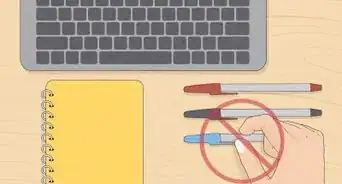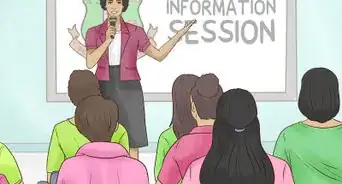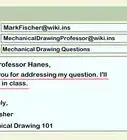This article was co-authored by Chloe Carmichael, PhD and by wikiHow staff writer, Amber Crain. Chloe Carmichael, PhD is a Licensed Clinical Psychologist who runs a private practice in New York City. With over a decade of psychological consulting experience, Dr. Chloe specializes in relationship issues, stress management, self esteem, and career coaching. She has also instructed undergraduate courses at Long Island University and has served as adjunct faculty at the City University of New York. Dr. Chloe completed her PhD in Clinical Psychology at Long Island University in Brooklyn, New York and her clinical training at Lenox Hill Hospital and Kings County Hospital. She is accredited by the American Psychological Association and is the author of “Nervous Energy: Harness the Power of Your Anxiety” and “Dr. Chloe's 10 Commandments of Dating.”
There are 7 references cited in this article, which can be found at the bottom of the page.
This article has been viewed 120,122 times.
If you've failed your first year of college, you're probably trying to work through some pretty difficult emotions right now. We understand and we want to help! We've put together a list of helpful tips you can use to get through this tough time. There's light at the end of this tunnel, even if it doesn't feel like it right now, and you can come out on the other side stronger and more capable than ever.
Steps
Expert Q&A
Did you know you can get expert answers for this article?
Unlock expert answers by supporting wikiHow
-
QuestionHow can I cope with stress if I am overwhelmed with school work?
 Chloe Carmichael, PhDChloe Carmichael, PhD is a Licensed Clinical Psychologist who runs a private practice in New York City. With over a decade of psychological consulting experience, Dr. Chloe specializes in relationship issues, stress management, self esteem, and career coaching. She has also instructed undergraduate courses at Long Island University and has served as adjunct faculty at the City University of New York. Dr. Chloe completed her PhD in Clinical Psychology at Long Island University in Brooklyn, New York and her clinical training at Lenox Hill Hospital and Kings County Hospital. She is accredited by the American Psychological Association and is the author of “Nervous Energy: Harness the Power of Your Anxiety” and “Dr. Chloe's 10 Commandments of Dating.”
Chloe Carmichael, PhDChloe Carmichael, PhD is a Licensed Clinical Psychologist who runs a private practice in New York City. With over a decade of psychological consulting experience, Dr. Chloe specializes in relationship issues, stress management, self esteem, and career coaching. She has also instructed undergraduate courses at Long Island University and has served as adjunct faculty at the City University of New York. Dr. Chloe completed her PhD in Clinical Psychology at Long Island University in Brooklyn, New York and her clinical training at Lenox Hill Hospital and Kings County Hospital. She is accredited by the American Psychological Association and is the author of “Nervous Energy: Harness the Power of Your Anxiety” and “Dr. Chloe's 10 Commandments of Dating.”
Licensed Clinical Psychologist When you are feeling stressed or anxious, it's either a sign that you need to improve your coping skills or that you need to take action to change your situation. If you are looking to improve your coping skills, start by managing your expectations of yourself. Sometimes being overwhelmed is actually a really healthy demonstration that you are aware of when you need to take a break.
When you are feeling stressed or anxious, it's either a sign that you need to improve your coping skills or that you need to take action to change your situation. If you are looking to improve your coping skills, start by managing your expectations of yourself. Sometimes being overwhelmed is actually a really healthy demonstration that you are aware of when you need to take a break.
References
- ↑ https://www.health.harvard.edu/blog/anxiety-in-college-what-we-know-and-how-to-cope-2019052816729
- ↑ https://www.health.harvard.edu/blog/anxiety-in-college-what-we-know-and-how-to-cope-2019052816729
- ↑ https://eduadvisor.my/articles/zero-hero-bounce-back-failing-semester-university/
- ↑ https://mhanational.org/how-talk-your-professor-about-your-mental-health
- ↑ Chloe Carmichael, PhD. Licensed Clinical Psychologist. Expert Interview. 29 May 2019.
- ↑ https://www.health.harvard.edu/blog/anxiety-in-college-what-we-know-and-how-to-cope-2019052816729
- ↑ http://www.apa.org/monitor/2014/09/cover-pressure.aspx
- ↑ https://eduadvisor.my/articles/zero-hero-bounce-back-failing-semester-university/
- ↑ https://eduadvisor.my/articles/zero-hero-bounce-back-failing-semester-university/
- ↑ https://www.psychologicalscience.org/observer/teaching-and-advising-first-year-students
- ↑ https://theprudentprofessor.com/options-for-failing-college-students/
- ↑ Chloe Carmichael, PhD. Licensed Clinical Psychologist. Expert Interview. 29 May 2019.





































































